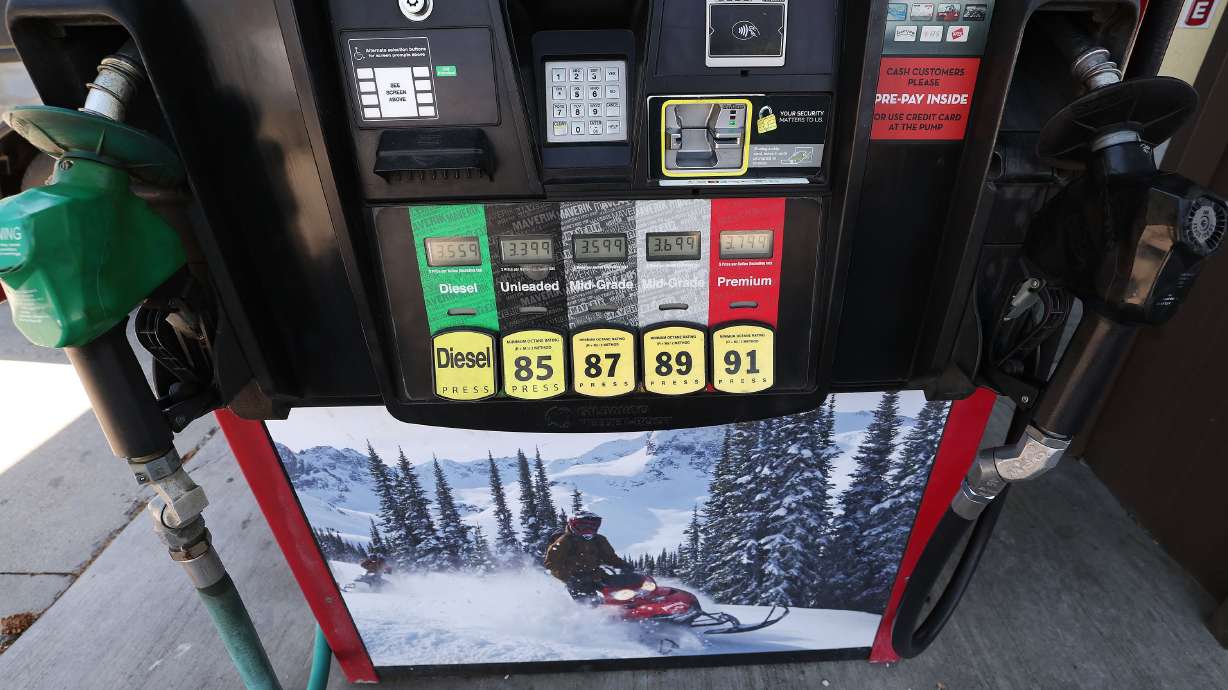Estimated read time: 5-6 minutes
This archived news story is available only for your personal, non-commercial use. Information in the story may be outdated or superseded by additional information. Reading or replaying the story in its archived form does not constitute a republication of the story.
SALT LAKE CITY — The world's largest supply of crude oil — the U.S. Strategic Petroleum Reserve — has been tossed around like a political football by various presidential administrations over the years, both Democratic and Republican.
The reserve was established in the 1970s as an emergency stop gap to ward off market volatility and keep OPEC in check after it quadrupled the price of oil, leading to widespread gasoline shortages.
Instead, the reserve has often been used for political gain and outside of the emergencies it was intended to temper.
Stored in huge underground salt caverns along the Gulf of Mexico, the reserve was filled to its designed capacity in 2009 of 727 million barrels of oil — in part due to the Great Recession, during which tapping the reserve was idled. At the end of 2021, the reserve's crude oil inventory was 594.7 million barrels of oil, or the equivalent of approximately 1,206 days of supply of total U.S. petroleum net imports, according to the U.S. Department of Energy.
Inflation and wars
Then something happened. The highest inflation seen in decades hit the United States and Russia invaded Ukraine. Gas prices spiked at the pump.
President Joe Biden started releasing oil from the reserve, with drawdowns that brought it to about the half its capacity — the fastest withdrawal on the record.
The Council on Foreign Relations said that, in November 2021, Biden announced a release of 32 million barrels in exchange agreements and 18 million barrels in sales, seen as an effort to pressure OPEC to increase production; some experts said it was a novel use of the reserve, given there was no supply disruption.
Then, in 2022, the Biden administration sold 180 million barrels of oil in about six months from the reserve, the largest ever sale to lower gas prices — which critics said was short lived and did very little.
GOP members of Congress have criticized the moves, slamming the Biden administration for using the reserve for political purposes during the mid-term elections and putting national security at risk.
"The Biden administration's strategy with the Strategic Petroleum Reserve reflects a shortsighted approach, tapping into our emergency oil supplies when convenient, while simultaneously stifling domestic production, particularly in Utah," Rep. John Curtis, R-Utah, told the Deseret News.
"You can't attack the oil and gas industry, say you want to put them out of business, and then complain when gas prices go up. We should embrace the fact that America's energy industry produces cleaner (oil) and with better standards than anywhere else in the world."
Fueling China
Forbes reported U.S. citizens were not the sole beneficiaries of the drawdowns; foreign nations got in on the new supply of oil.
"Data from the U.S. Department of Energy show that the U.S. trading subsidiary of China's state refining company UNIPEC purchased just under two million barrels of SPR oil in 2022. But that figure is likely low since SPR sales are unrestricted, meaning refiners and traders that purchase SPR oil can sell those barrels to other buyers as they please," the media outlet reported.
Amid the drawdowns and worries over replenishment, House Energy and Commerce Committee Chair Cathy McMorris Rodgers, R-Wash., and Senate Energy and Natural Resources Committee Ranking Member John Barrasso, R-Wyo., sent a letter to Department of Energy Secretary Jennifer Granholm following reports the Biden administration is preparing to further drain the Strategic Petroleum Reserve this year.
"The DOE has overseen the largest sale in history, amounting to a total of 290 million barrels. When President Biden took office in January 2021, the SPR contained 638 million barrels of oil. Today, the SPR currently contains 367 million barrels of oil, which represents nearly a 42% decline from when President Biden took office," the letter in May asserts.
In August, the Biden administration canceled plans to prop up the Strategic Petroleum Reserve with the purchase of six million barrels, citing high prices of crude oil and a desire to make a better deal for the taxpayer. In fact, DOE Secretary Jennifer Granholm said it is doubtful the reserve will be fully replenished at the end of Biden's first term, but the administration is taking some steps to build back its capacity.
Reuters reported the United States has bought back about 38.6 million barrels and canceled congressionally mandated sales of 140 million barrels through 2027. The administration has said it wants to keep buying oil as long as the price remains below $80 a barrel.
In attempts to "fix" what the GOP says is broken about the reserve, Rodgers ran a reform measure that passed the House requiring that any nonemergency sale of reserves be accompanied by the development of a plan for domestic production to offset what's being sold. She also spearheaded a measure in 2023, which passed the House with bipartisan support, restricting the sale of crude oil supplies in the reserve to China.
Too little too late?
Critics say Biden has put the United States in an untenable position when it comes to a vital resource needed to run the country — and needed now despite any Green agenda that is trying to wean the nation from fossil fuels.










